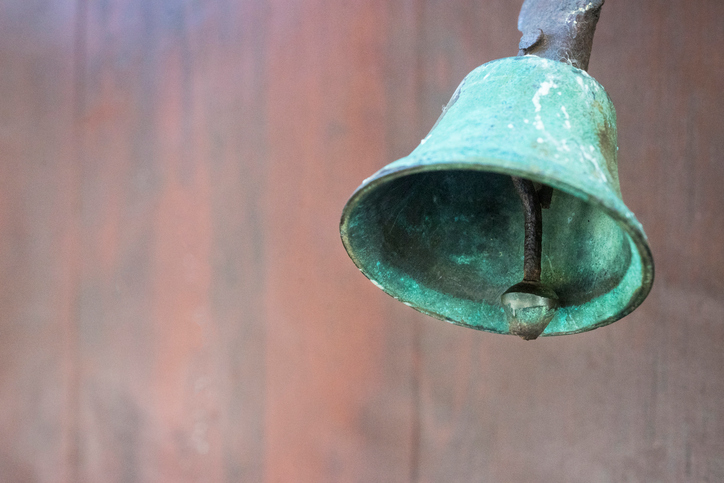chime
(noun, verb)
/tʃaɪm/
 LISTEN
LISTEN


As a noun, a chime is set of bells that produce a musical tone when they are struck. Chime is also a name for any musical instrument that produces a similar sound. Each of the sounds these bells or instruments produce is called a chime. As a verb, to chime means ‘to sound harmoniously or in chimes,’ ‘to make a bell or something similar produce a musical sound,’ and ‘to announce or indicate by chiming.’ Figuratively, it means ‘to speak in a musical way,’ and also ‘to agree.’
Example sentences
- A chime stood on the altar.
- There was a range of instruments, including trumpets, violins, and chimes.
- Lucy heard the chime of the church bell.
- The bells were chiming for the evening service.
- The bellringers grasped the ropes and pulled them to chime the bells.
- The church bells chimed midnight.
- "Good morning," the children chimed, as their teacher arrived.
- It seems our views on this issue don't chime.
Words often used with chime
chime in: to enter a conversation, especially by interrupting or offering an unsolicited opinion. Example: “The meeting was a little chaotic, with everyone chiming in, but we got some good ideas out of it.”
chime in with: agree or be in harmony with. Example: “Some parts of the politician’s speech don’t seem to chime in with official party policy.”
wind chimes: a decorative object made from metal or bamboo tubes, bells, shells, or similar objects, that chime when moved by the wind. Example: “The sound of the wind chimes woke me every morning.”
In pop culture
Chime for Change is the name of a global campaign, founded by Gucci, together with singer Beyoncé Knowles-Carter and actor Salma Hayek-Pinault, to empower girls and women. We couldn’t find any specific information on why they chose that name, but obviously chime for change rhymes with time for change. In addition, traditionally church bells were often chimed to announce important events, such as the end of a war, for example, and bells are often chimed in some sporting contests, like boxing, to signal the end of a round. As the campaign makes a lot of use of social media, there may also be a suggestion of the chimes of electronic notifications and, as the campaign is centered on women united and coming together, perhaps there is even a hint of the sense of agreeing. In any case, you can find out more about Chime for Change by watching this video clip:
and you can also read about the work the campaign does on its website here.
Additional information
A chime or chimb is also the part of a barrel where the staves (the bits that make the rounded sides of the barrel) protrude above the top or below the bottom of the barrel.
Other forms
chimer (noun)
Origin
Chime dates back to the late 13th century. The Middle English noun chymbe originally meant ‘cymbal.’ A part of its origin is uncertain. Some linguists think it emerged as a shortened form of chymbe-belle, which was actually a misinterpretation of chimbelle, from the Old English cimbal or cimbala (cymbal). Others believe that it came into Middle English from the Old French chimbe, which was already a shortened form for the instrument. In this theory the French word was, again, misinterpreted as chymbe-belle, which is why both chymbe and chymbe-belle appeared in Middle English texts around the same time. Whether it came from the Old French or Old English source, chime can be traced back to the Latin cymbalum (cymbal), from the Greek kymbalon (cymbal), from the Greek kymbe (a bowl or drinking cup). The sense changed to ‘set of bells in a church or clock tower’ or ‘apparatus for striking bells’ around the mid-15th century. The meaning ‘set of bells tuned to a musical scale’ dates back to the mid-16th century. The verb comes from the noun. The Middle English verb chymbe dates back to the mid-14th century; it was only originally said of metal, but expanded to describe human voices by the late 14th century. The expression to chime in originally meant ‘to join harmoniously’ and was only used in the musical sense. It expanded to conversation by the early 19th century.
Word of the Day is released Monday through Friday.



